County schools now have access to EpiPens
Published 6:30 am Tuesday, January 30, 2018

- Limestone County school nurses Rhonda Gibbs and Elayne Perkins show off the new stock of EpiPens they received through the EpiPen4Schools program.
Approximately one out of every 13 children in the United States has a food allergy so severe it puts them at risk for anaphylaxis, a potentially life-threatening reaction that can also be caused by insect bites, medications and latex.
Limestone County Schools takes pride in having a proactive stance when it comes to their students and allergen exposure, but there is always potential for a first-time reaction or accidental exposure.
That is why Rhonda Gibbs, lead nurse for the county school system, decided to take advantage of the EpiPen4Schools program. Facilitated by BioRidge Pharma, the nationwide program provides four epinephrine pens to each school in the district. The pens are commonly referred to as EpiPens and contain a single dose of epinephrine, the only first-line treatment for anaphylaxis.
Although school nurse Elayne Perkins can only recall two students in the last few years who required an EpiPen, she said that when it comes to the safety of students and school staff, you can never be too prepared.
“We have seen an increase in the number of food allergies out there, and there is always the chance that a student will have a first-time reaction at school,” Perkins said. “The EpiPen could save a life.”
Before, only students with a prescription from their personal physician had access to an EpiPen. Now, thanks to the free program, every school in the system has access to the life-saving pens.
The EpiPen4Schools program requires that a physician or nurse practitioner associated with the school system prescribe the pens. April Seay, a certified registered nurse practitioner, wrote the prescription for the county schools.
The program will replenish used pens and replace expired pens as needed.
The district just received the shipment of pens, which Perkins said she and Gibbs will distribute to all of the county schools over the next two weeks.
Once each school receives the pens, the school’s nurse will train teachers and support staff on how to identify signs of anaphylaxis and how to properly administer the pen.
“Anaphylaxis can kill,” Perkins said. “The EpiPen works like an antihistamine. It helps bring people who have had a reaction out of a very dangerous situation.”





